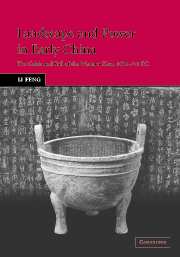Book contents
- Frontmatter
- Contents
- List of figures
- List of maps
- Acknowledgments
- Scholarly conventions
- Topographical map of China
- Chronology of Western Zhou kings
- The sixty-day circle
- Introduction
- 1 Foundation of the Western Zhou state: constructing the political space
- 2 Disorder and decline: the political crisis of the Western Zhou state
- 3 Enemies at the gate: the war against the Xianyun and the northwestern frontier
- 4 The fall of the Western Zhou: partisan struggle and spatial collapse
- 5 The eastward migration: reconfiguring the Western Zhou state
- 6 The legacy of the Western Zhou
- Conclusion
- Appendix 1 The periphery: the Western Zhou state at its maximum geographical extent
- Appendix 2 The relationship between the Quanrong and the Xianyun
- Appendix 3 The Bamboo Annals and issues of the chronology of King You's reign
- Bibliography
- Index to inscribed bronzes
- General index
Conclusion
Published online by Cambridge University Press: 22 September 2009
- Frontmatter
- Contents
- List of figures
- List of maps
- Acknowledgments
- Scholarly conventions
- Topographical map of China
- Chronology of Western Zhou kings
- The sixty-day circle
- Introduction
- 1 Foundation of the Western Zhou state: constructing the political space
- 2 Disorder and decline: the political crisis of the Western Zhou state
- 3 Enemies at the gate: the war against the Xianyun and the northwestern frontier
- 4 The fall of the Western Zhou: partisan struggle and spatial collapse
- 5 The eastward migration: reconfiguring the Western Zhou state
- 6 The legacy of the Western Zhou
- Conclusion
- Appendix 1 The periphery: the Western Zhou state at its maximum geographical extent
- Appendix 2 The relationship between the Quanrong and the Xianyun
- Appendix 3 The Bamboo Annals and issues of the chronology of King You's reign
- Bibliography
- Index to inscribed bronzes
- General index
Summary
This book begins by investigating the geopolitical formation of the Western Zhou state, particularly its western part where the Zhou capitals were located. The investigation is further strengthened by an effort to recover the geopolitical perimeter of the Western Zhou through reconstructing its cultural and political periphery. The research integrates archaeological discoveries and inscriptional and textual records with the features of the landscape and presents us with a visible image of one of the pre-imperial states in China occupying a particular geographical space. It demonstrates that the deployment of the Western Zhou state both was conditioned by and responded to the limit and potential of the land. This thread of investigation runs through the whole book, providing us with a unique path to understanding the historical process of the weakening and fall of the Western Zhou.
It is suggested, therefore, that the crisis of the Western Zhou state can be meaningfully conceived as both a structural and a spatial one. The Western Zhou state was challenged in space by two forces: an internal force that moved its constituent parts away from its political core; and an external force that attacked the geographical perimeter of the Western Zhou state with ever increasing power. The responses to this spatial crisis, as so manifestly demonstrated during the decades of King Xuan's restoration, were directed at consolidating military defenses on the frontiers and at strengthening relations with the regional states in the east.
- Type
- Chapter
- Information
- Landscape and Power in Early ChinaThe Crisis and Fall of the Western Zhou 1045–771 BC, pp. 297 - 299Publisher: Cambridge University PressPrint publication year: 2006



